高中英语第六册(选修)各单元基础语言知识目标
- 格式:doc
- 大小:54.50 KB
- 文档页数:8
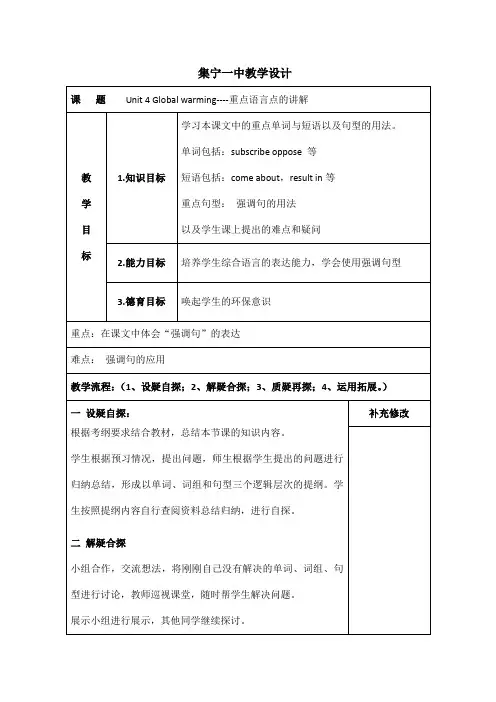
集宁一中教学设计品味人生1、不管鸟的翅膀多么完美,如果不凭借空气,鸟就永远飞不到高空。
想象力是翅膀,客观实际是空气,只有两方面紧密结合,才能取得显着成绩。
2、想停下来深情地沉湎一番,怎奈行驶的船却没有铁锚;想回过头去重温旧梦,怎奈身后早已没有了归途。
因为时间的钟摆一刻也不曾停顿过,所以生命便赋予我们将在汹涌的大潮之中不停地颠簸。
3、真正痛苦的人,却在笑脸的背后,流着别人无法知道的眼泪,生活中我们笑得比谁都开心,可是当所有的人潮散去的时候,我们比谁都落寂。
4、温暖是飘飘洒洒的春雨;温暖是写在脸上的笑影;温暖是义无反顾的响应;温暖是一丝不苟的配合。
5、幸福,是一种人生的感悟,一种个人的体验。
也许,幸福是你风尘仆仆走进家门时亲切的笑脸;也许,幸福是你卧病床上百无聊赖时温馨的问候;也许,幸福是你屡遭挫折心灰意冷时劝慰的话语;也许,幸福是你历经艰辛获得成功时赞赏的掌声。
关键的是,你要有一副热爱生活的心肠,要有一个积极奋进的目标,要有一种矢志不渝的追求。
这样,你才能感受到幸福。
6、母爱是迷惘时苦口婆心的规劝;母爱是远行时一声殷切的叮咛;母爱是孤苦无助时慈祥的微笑。
7、淡淡素笺,浓浓墨韵,典雅的文字,浸染尘世情怀;悠悠岁月,袅袅茶香,别致的杯盏,盛满诗样芳华;云淡风轻,捧茗品文,灵动的音符,吟唱温馨暖语;春花秋月,红尘阡陌,放飞的思绪,漫过四季如歌。
读一段美文,品一盏香茗,听一曲琴音,拾一抹心情。
8、尘缘飞花,人去楼空,梦里花落为谁痛?顾眸流盼,几许痴缠。
把自己揉入了轮回里,忆起,在曾相逢的梦里;别离,在泪眼迷朦的花落间;心碎,在指尖的苍白中;淡落,在亘古的残梦中。
在夜莺凄凉的叹息里,让片片细腻的柔情,哽咽失语在暗夜的诗句里。
9、用不朽的“人”字支撑起来的美好风景,既有“虽体解吾犹未变兮”的执着吟哦,也有“我辈岂是蓬蒿人”的跌宕胸怀;既有“我以我血荐轩辕”的崇高追求,也有“敢教日月换新天”的豪放气魄。
33 我是一只蜜蜂,在祖国的花园里,飞来飞去,不知疲倦地为祖国酿制甘甜的蜂蜜;我是一只紫燕,在祖国的蓝天上,穿越千家万户,向祖国向人民报告春的信息;我是一滴雨点,在祖国的原野上,从天而降,滋润干渴的禾苗;我是一株青松,在祖国的边疆,傲然屹立,显示出庄严的身姿。
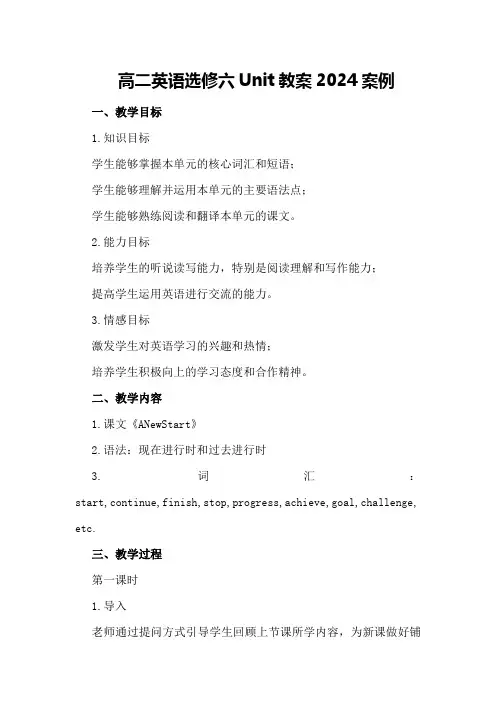
高二英语选修六Unit教案2024案例一、教学目标1.知识目标学生能够掌握本单元的核心词汇和短语;学生能够理解并运用本单元的主要语法点;学生能够熟练阅读和翻译本单元的课文。
2.能力目标培养学生的听说读写能力,特别是阅读理解和写作能力;提高学生运用英语进行交流的能力。
3.情感目标激发学生对英语学习的兴趣和热情;培养学生积极向上的学习态度和合作精神。
二、教学内容1.课文《ANewStart》2.语法:现在进行时和过去进行时3.词汇:start,continue,finish,stop,progress,achieve,goal,challenge, etc.三、教学过程第一课时1.导入老师通过提问方式引导学生回顾上节课所学内容,为新课做好铺垫。
2.课文阅读学生自主阅读课文,理解文章大意;老师通过提问检查学生对课文的理解。
3.词汇学习老师讲解并让学生跟读本节课的核心词汇;学生通过例句和练习巩固词汇。
4.语法讲解老师通过实例讲解现在进行时和过去进行时的用法;学生通过练习巩固语法知识。
第二课时1.复习老师通过提问方式检查学生对上节课所学内容的掌握情况。
2.课文深入阅读学生分角色朗读课文,体会文章情感;老师通过问题引导学生深入理解课文。
3.写作练习老师给出写作题目,学生进行课堂写作;老师选取优秀作品进行展示和点评。
第三课时1.听力训练老师播放与本单元话题相关的听力材料;学生完成听力练习,老师解答疑问。
2.口语练习学生分组进行口语练习,模拟真实场景;老师选取优秀小组进行展示和点评。
3.语法巩固老师通过练习检查学生对现在进行时和过去进行时的掌握情况;学生完成练习,老师解答疑问。
第四课时1.小组讨论老师给出讨论话题,学生分组进行讨论;各小组汇报讨论成果,老师进行点评。
2.课文复习学生自主复习课文,巩固所学知识;老师通过提问检查学生对课文的掌握情况。
3.家庭作业布置老师布置与本节课相关的家庭作业,要求学生按时完成。
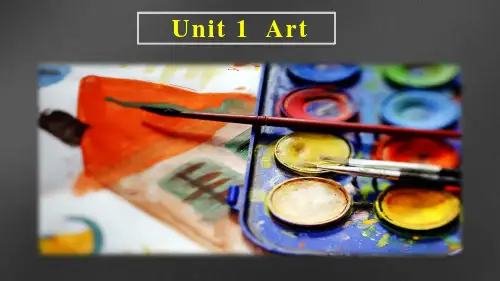
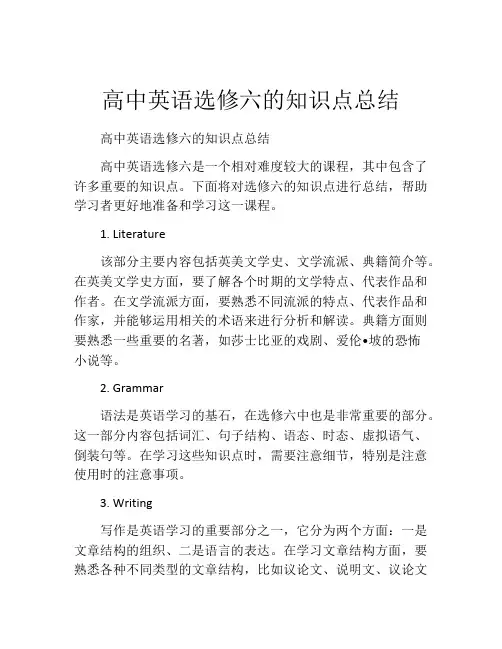
高中英语选修六的知识点总结高中英语选修六的知识点总结高中英语选修六是一个相对难度较大的课程,其中包含了许多重要的知识点。
下面将对选修六的知识点进行总结,帮助学习者更好地准备和学习这一课程。
1. Literature该部分主要内容包括英美文学史、文学流派、典籍简介等。
在英美文学史方面,要了解各个时期的文学特点、代表作品和作者。
在文学流派方面,要熟悉不同流派的特点、代表作品和作家,并能够运用相关的术语来进行分析和解读。
典籍方面则要熟悉一些重要的名著,如莎士比亚的戏剧、爱伦•坡的恐怖小说等。
2. Grammar语法是英语学习的基石,在选修六中也是非常重要的部分。
这一部分内容包括词汇、句子结构、语态、时态、虚拟语气、倒装句等。
在学习这些知识点时,需要注意细节,特别是注意使用时的注意事项。
3. Writing写作是英语学习的重要部分之一,它分为两个方面:一是文章结构的组织、二是语言的表达。
在学习文章结构方面,要熟悉各种不同类型的文章结构,比如议论文、说明文、议论文等。
在语言表达方面,要注意字词的准确性、词语搭配和句子结构。
4. Listening and Speaking听力和口语是语言能力的体现。
在选修六中,听力和口语的训练主要集中在理解听力材料和能够流利地表达自己的观点。
要锻炼听力和口语能力,可以通过听录音、看电视、参加英语角等方式来进行训练。
5. Reading and Comprehension阅读理解是英语学习的重要部分之一,它包括阅读理解和阅读技巧两个方面。
在阅读理解方面,要提高自己理解能力,能够从文章中获取信息、理解文章的意思和推测信息。
在阅读技巧方面,要掌握一些阅读技巧,在阅读过程中快速获取信息。
以上就是高中英语选修六的知识点总结,希望对大家有所帮助。
要想学好选修六,需要不断地练习和提高自己的英语实力,坚持不懈,定能取得好成绩。
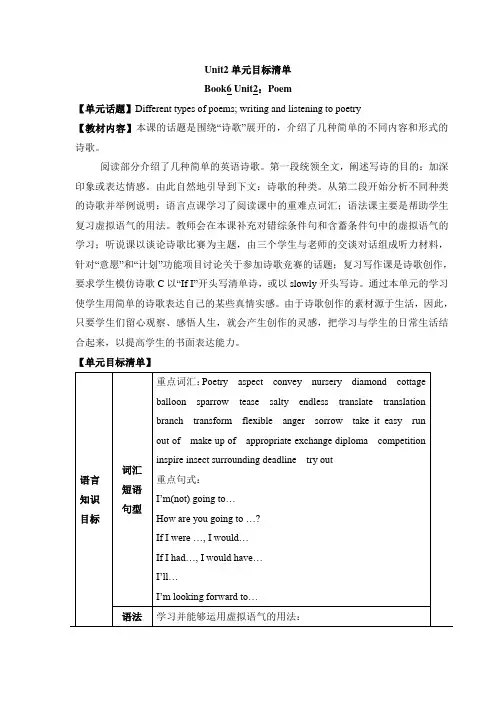
Unit2单元目标清单
Book6 Unit2:Poem
【单元话题】Different types of poems; writing and listening to poetry
【教材内容】本课的话题是围绕“诗歌”展开的,介绍了几种简单的不同内容和形式的诗歌。
阅读部分介绍了几种简单的英语诗歌。
第一段统领全文,阐述写诗的目的:加深印象或表达情感。
由此自然地引导到下文:诗歌的种类。
从第二段开始分析不同种类的诗歌并举例说明;语言点课学习了阅读课中的重难点词汇;语法课主要是帮助学生复习虚拟语气的用法。
教师会在本课补充对错综条件句和含蓄条件句中的虚拟语气的学习;听说课以谈论诗歌比赛为主题,由三个学生与老师的交谈对话组成听力材料,针对“意愿”和“计划”功能项目讨论关于参加诗歌竞赛的话题;复习写作课是诗歌创作,要求学生模仿诗歌C以“If I”开头写清单诗,或以slowly开头写诗。
通过本单元的学习使学生用简单的诗歌表达自己的某些真情实感。
由于诗歌创作的素材源于生活,因此,只要学生们留心观察、感悟人生,就会产生创作的灵感,把学习与学生的日常生活结合起来,以提高学生的书面表达能力。
【单元目标清单】。
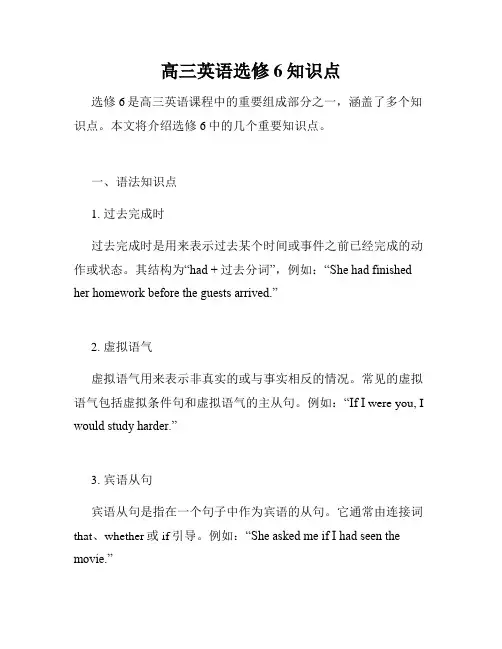
高三英语选修6知识点选修6是高三英语课程中的重要组成部分之一,涵盖了多个知识点。
本文将介绍选修6中的几个重要知识点。
一、语法知识点1. 过去完成时过去完成时是用来表示过去某个时间或事件之前已经完成的动作或状态。
其结构为“had + 过去分词”,例如:“She had finished her homework before the guests arrived.”2. 虚拟语气虚拟语气用来表示非真实的或与事实相反的情况。
常见的虚拟语气包括虚拟条件句和虚拟语气的主从句。
例如:“If I were you, I would study harder.”3. 宾语从句宾语从句是指在一个句子中作为宾语的从句。
它通常由连接词that、whether或if引导。
例如:“She asked me if I had seen the movie.”二、阅读技巧知识点1. 推断通过阅读理解文章中的线索并结合常识,我们可以推断出一些未明确提及的信息。
在进行推断时,要注意根据文章所提供的信息进行逻辑推理。
2. 判断在阅读理解中,经常需要进行判断题的选择。
为了正确判断,需要仔细阅读文章,理解文章的主旨和细节,并根据文章提供的线索做出合理的判断。
三、写作技巧知识点1. 议论文写作技巧议论文是一种需要表达自己观点的文章形式。
在写议论文时,要明确观点,并用事实、数据、论据等支持观点。
同时要注意语言表达的准确性和逻辑性。
2. 段落结构在写作中,每个段落应该有一个明确的主题句,用来概括段落的主要内容。
同时,段落之间应该有适当的过渡句,使文章结构更加紧密。
四、听力技巧知识点1. 注意听力材料的细节信息在听力理解中,细节信息常常是解答问题的关键。
细心听取材料中的具体细节,例如数字、时间、地点等,以便更好地理解和回答问题。
2. 多练习听力题型高考英语听力部分的题型多种多样,包括听力短文填空、听力选择题等。
为了熟悉和掌握各种题型的解题方法,平时要多进行听力练习。
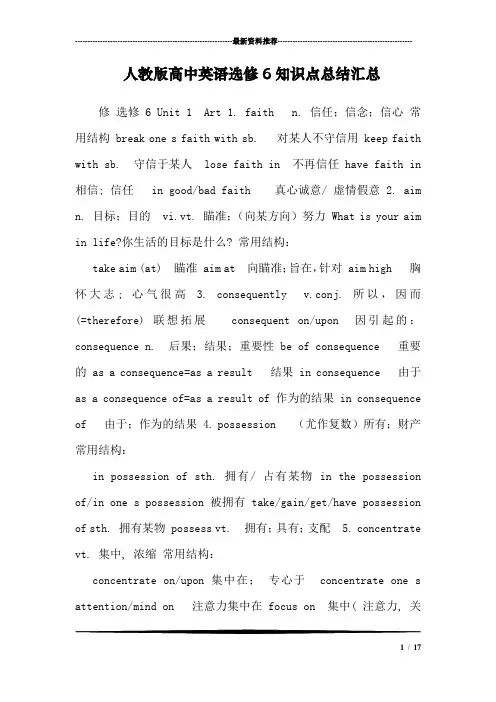
---------------------------------------------------------------最新资料推荐------------------------------------------------------ 人教版高中英语选修6知识点总结汇总修选修 6 Unit 1 Art 1. faith n. 信任;信念;信心常用结构 break one s faith with sb. 对某人不守信用 keep faith with sb. 守信于某人 lose faith in 不再信任 have faith in 相信; 信任 in good/bad faith 真心诚意/ 虚情假意 2. aim n. 目标;目的 vi.vt. 瞄准;(向某方向)努力 What is your aim in life?你生活的目标是什么? 常用结构:take aim (at) 瞄准 aim at 向瞄准;旨在,针对 aim high 胸怀大志; 心气很高 3. consequently v.conj. 所以,因而(=therefore) 联想拓展consequent on/upon 因引起的;consequence n. 后果;结果;重要性 be of consequence 重要的 as a consequence=as a result 结果 in consequence 由于as a consequence of=as a result of 作为的结果 in consequence of 由于;作为的结果 4. possession (尤作复数)所有;财产常用结构:in possession of sth. 拥有/ 占有某物 in the possession of/in one s possession 被拥有 take/gain/get/have possession of sth. 拥有某物 possess vt. 拥有;具有;支配 5. concentrate vt. 集中, 浓缩常用结构:concentrate on/upon 集中在;专心于 concentrate one s attention/mind on 注意力集中在 focus on 集中( 注意力, 关1/ 17心) 于 fix ones attention/eyes/mind on 集中精力/ 目光/ 心思在 The children fixed their eyes on the teacher in class.孩子们聚精会神地听老师讲课。

高中英语(外研版)选修6 1-6单元知识点讲解Module 1【词条1】lack【点拨】lack动词,意为"缺乏,没有"。
如:He is good at his job b ut he seems to lack confidence.What he lacks in experience he makes up for in enthusiasm.【拓展】ck的常用短语有:be lacking"欠缺,缺乏";be lacking in"缺乏(某种品质、特点等";lack(for nothing"应有尽有"。
如:Money for the project is still lacking.I think the film is lacki ng in pace.They have got everything ready and they lack for ck还可作名词,常与of连用,意为"缺乏,没有"。
for lack of"因为缺乏……"。
如:The work had to be stopped for la ck of funds.The flowers withered for lack of water.【词条2】reply【点拨】名词,意为"回答,答复",常与介词to连用。
如:Is it a reply to the first or the second letter?To my anger,she ma de no reply to my question.其常用在短语in reply to中,意为"作为对……的回答,回复"。
如: What did he do in reply to your challenge?【拓展】reply也可作动词,意为"回答,答复",reply(t o.../that...。
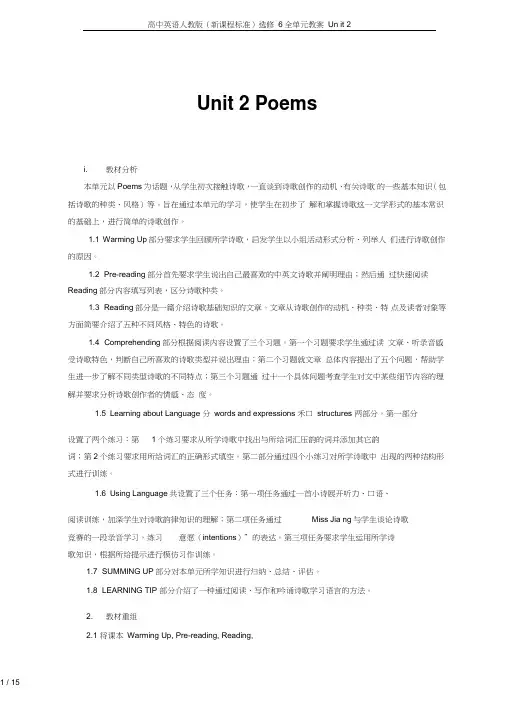
Unit 2 Poemsi. 教材分析本单元以Poems为话题,从学生初次接触诗歌,一直谈到诗歌创作的动机、有关诗歌的一些基本知识(包括诗歌的种类、风格)等。
旨在通过本单元的学习,使学生在初步了解和掌握诗歌这一文学形式的基本常识的基础上,进行简单的诗歌创作。
1.1 Warming Up部分要求学生回顾所学诗歌,启发学生以小组活动形式分析、列举人们进行诗歌创作的原因。
1.2 Pre-reading部分首先要求学生说出自己最喜欢的中英文诗歌并阐明理由;然后通过快速阅读Reading部分内容填写列表,区分诗歌种类。
1.3 Reading部分是一篇介绍诗歌基础知识的文章。
文章从诗歌创作的动机、种类、特点及读者对象等方面简要介绍了五种不同风格、特色的诗歌。
1.4 Comprehending部分根据阅读内容设置了三个习题。
第一个习题要求学生通过读文章、听录音感受诗歌特色,判断自己所喜欢的诗歌类型并说出理由;第二个习题就文章总体内容提出了五个问题,帮助学生进一步了解不同类型诗歌的不同特点;第三个习题通过十一个具体问题考查学生对文中某些细节内容的理解并要求分析诗歌创作者的情感、态度。
1.5 Learning about Language 分words and expressions 禾口structures 两部分。
第一部分设置了两个练习:第1个练习要求从所学诗歌中找出与所给词汇压韵的词并添加其它韵词;第2个练习要求用所给词汇的正确形式填空。
第二部分通过四个小练习对所学诗歌中出现的两种结构形式进行训练。
1.6 Using Language共设置了三个任务:第一项任务通过一首小诗展开听力、口语、阅读训练,加深学生对诗歌韵律知识的理解;第二项任务通过Miss Jia ng与学生谈论诗歌竞赛的一段录音学习,练习意愿(intentions)”的表达。
第三项任务要求学生运用所学诗歌知识,根据所给提示进行模仿习作训练。
1.7 SUMMING UP部分对本单元所学知识进行归纳、总结、评估。
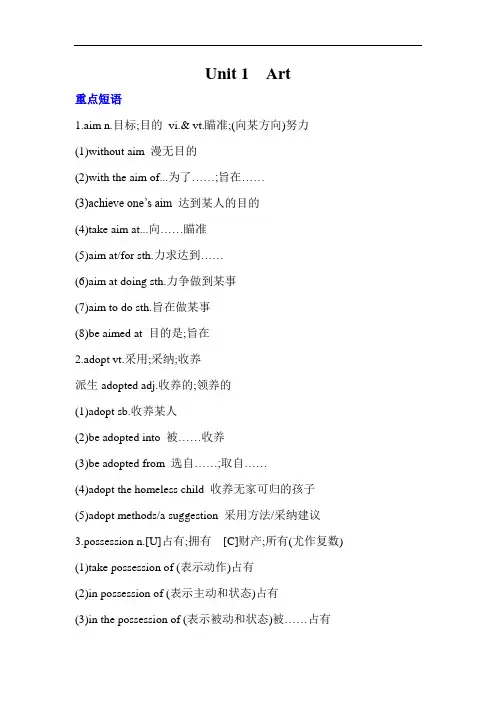
Unit 1Art重点短语1.aim n.目标;目的vi.& vt.瞄准;(向某方向)努力(1)without aim 漫无目的(2)with the aim of...为了……;旨在……(3)achieve one’s aim 达到某人的目的(4)take aim at...向……瞄准(5)aim at/for sth.力求达到……(6)aim at doing sth.力争做到某事(7)aim to do sth.旨在做某事(8)be aimed at 目的是;旨在2.adopt vt.采用;采纳;收养派生adopted adj.收养的;领养的(1)adopt sb.收养某人(2)be adopted into 被……收养(3)be adopted from 选自……;取自……(4)adopt the homeless child 收养无家可归的孩子(5)adopt methods/a suggestion 采用方法/采纳建议3.possession n.[U]占有;拥有[C]财产;所有(尤作复数)(1)take possession of (表示动作)占有(2)in possession of (表示主动和状态)占有(3)in the possession of (表示被动和状态)被……占有(4)be possessed of 拥有(5)possess v.拥有4.attempt n.努力;尝试;企图vt.尝试;企图(1)make an attempt to do/at doing sth.试图做某事at the first attempt 第一次尝试(2)attempt to do sth.努力做某事5.on the other hand(可是)另一方面on the one hand...;on the other hand...(引出不同的,尤指对立的观点、思想等)一方面……,另一方面(却)……(1)first(ly)...;second(ly)...第一……;第二……(2)for one thing...;for another...一方面……,另一方面……6.appeal vi.有感染力;呼吁;求助vt.将……上诉n.呼吁;恳求派生appealing adj.有吸引力的;令人感兴趣的;恳求的(1)appeal to sb.for/to do sth.恳求/呼吁某人做某事(2)appeal to sb.吸引某人(3)make an appeal 发出呼吁重点句型1.Among the painters who broke away from the traditional style of painting were the Impressionists,who lived and worked in Paris.在那些突破传统画法的画家中有印象派画家,他们在巴黎生活和工作。
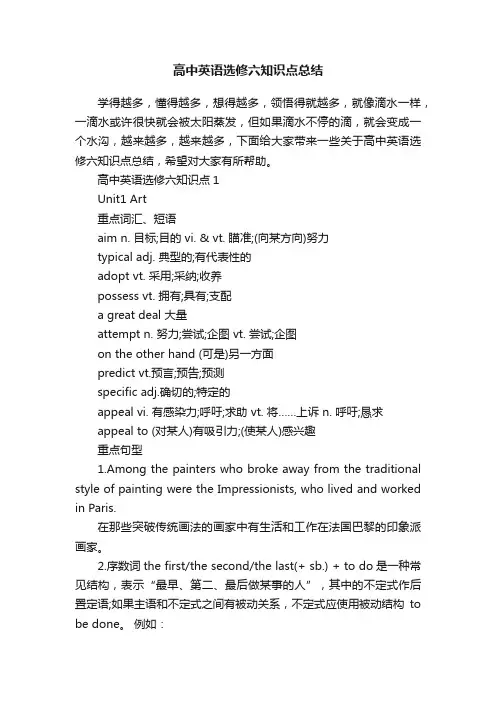
高中英语选修六知识点总结学得越多,懂得越多,想得越多,领悟得就越多,就像滴水一样,一滴水或许很快就会被太阳蒸发,但如果滴水不停的滴,就会变成一个水沟,越来越多,越来越多,下面给大家带来一些关于高中英语选修六知识点总结,希望对大家有所帮助。
高中英语选修六知识点1Unit1 Art重点词汇、短语aim n. 目标;目的 vi. & vt. 瞄准;(向某方向)努力typical adj. 典型的;有代表性的adopt vt. 采用;采纳;收养possess vt. 拥有;具有;支配a great deal 大量attempt n. 努力;尝试;企图 vt. 尝试;企图on the other hand (可是)另一方面predict vt.预言;预告;预测specific adj.确切的;特定的appeal vi. 有感染力;呼吁;求助 vt. 将……上诉 n. 呼吁;恳求appeal to (对某人)有吸引力;(使某人)感兴趣重点句型1.Among the painters who broke away from the traditional style of painting were the Impressionists, who lived and worked in Paris.在那些突破传统画法的画家中有生活和工作在法国巴黎的印象派画家。
2.序数词the first/the second/the last(+ sb.) + to do是一种常见结构,表示“最早、第二、最后做某事的人”,其中的不定式作后置定语;如果主语和不定式之间有被动关系,不定式应使用被动结构to be done。
例如:My monitor is always the first to come to school and the last to leave.我的班长总是第一个到校、最后一个离开。
To tell the truth, he was the last person to be met with by the manager.说实话,他是最后一个被经理接见的人。
高二英语选修六相关知识点高二英语选修六是英语课程中的一门重要课程,涵盖了许多相关的知识点。
本文将介绍并总结高二英语选修六课程中的相关知识点,包括语法、词汇、阅读理解和写作技巧等内容。
一、语法知识点1. 时态和语态:选修六中会涉及到各种时态和语态的应用,如一般现在时、一般过去时、一般将来时、过去进行时、被动语态等。
在学习过程中,要注意掌握各种时态和语态的用法和表示方式。
2. 从句:从句是选修六中的重点内容之一,包括宾语从句、主语从句、定语从句和状语从句等。
了解从句的特点和用法,并能够正确运用于实际语言表达中。
3. 并列连词:选修六中还包括一些常用的并列连词,如and、but、or等。
了解这些连词的用法和连接两个或多个并列成分的方式,能够正确使用它们构成流畅的句子。
二、词汇知识点1. 同义词和近义词:选修六中会涉及到一定量的词汇学习,包括一些同义词和近义词的辨析。
掌握这些词汇的用法和区别,能够丰富自己的词汇量,提高语言表达能力。
2. 词根和词缀:了解一些常见的词根和词缀,能够帮助理解和记忆一些生词和短语。
同时,在写作中能够运用一些词根和词缀,丰富自己的表达方式。
三、阅读理解知识点1. skimming和scanning:选修六中会出现一些英文文章,包括短文、讲演稿、广告等。
掌握快速阅读的技巧,如略读和快速搜索关键词的能力,能够更好地理解文章的主旨和重点。
2. 理解文章结构和段落组织:选修六中的文章通常会有明确的结构和段落组织,如引言、主体、结论等。
了解文章结构和段落组织,能够更好地理解文章的逻辑关系和作者的意图。
四、写作技巧知识点1. 句子结构和篇章连贯:选修六中的写作要求考察句子结构的多样性和篇章连贯性。
要注意使用各种句型和连接词,使句子和段落之间流畅连贯,表达清晰准确。
2. 写作主题和观点:在选修六的写作中,关注主题和观点的准确表达。
要能够明确自己的写作目的和观点,并能用恰当的语言表达出来。
总结:高二英语选修六是一门综合性课程,涉及了语法、词汇、阅读理解和写作技巧等多个方面的知识点。
高中英语人教版选修6知识点汇总高中英语人教版选修6知识点汇总课程目标高中英语人教版选修6的目标是帮助学生掌握必要的语法知识,提高阅读能力和写作技巧,掌握常用词汇和表达方式,能够进行基本的听说读写活动,并能够进行简单的跨文化交流。
核心知识点1、掌握虚拟语气、情态动词等语法知识。
2、熟悉各种类型的阅读材料,包括小说、传记、新闻等。
3、掌握常见的写作技巧,如段落结构、修辞手法等。
4、掌握常见的动词、名词、形容词等词汇,以及相关的短语和表达方式。
5、能够进行基本的听说读写活动,如听懂英语讲座、进行英语演讲、阅读英语文章、写作简单的英语作文等。
6、能够进行简单的跨文化交流,了解不同文化之间的差异和相似之处。
课程重点与难点1、虚拟语气:理解虚拟语气的含义和用法,掌握虚拟条件句和虚拟语气从句的用法。
2、情态动词:掌握情态动词的用法,包括现在和过去的形式,以及相关的短语和表达方式。
3、阅读理解:提高阅读速度和理解能力,能够准确理解阅读材料的主旨和细节。
4、写作技巧:掌握常见的写作技巧,如段落结构、修辞手法等,提高写作水平。
5、词汇和表达方式:掌握常见的动词、名词、形容词等词汇,以及相关的短语和表达方式。
6、听说读写活动:提高听说读写能力,能够进行基本的听说读写活动。
7、跨文化交流:了解不同文化之间的差异和相似之处,能够进行简单的跨文化交流。
案例分析1、虚拟语气:If I were you, I would choose to study abroad. 如果我是你,我会选择去国外留学。
2、情态动词:You should have done your homework before the exam.你应该在考试前做完作业。
3、阅读理解:一篇关于环保的文章中提到“We can make a difference to the environment if we all make a small effort.”意思是“如果我们每个人都做出一点努力,就可以对环境产生巨大的影响。
最新人教版高中英语选修6全册教案Unit 1 ArtThe First Period ReadingTeaching goals 教学目标1. Target language目标语言:重点词汇和短语Realistic, abstract, religion, religious, sculpture, gallery, belief, consequent,consequently, aim, symbol, value, focus, possession, convince, impressionism, impressionist, shadow, ridiculous, nowadays, attempt, predict, the Renaissance, focus on, a great deal , scores ofThere are so many… that it would be impossible to …People became more focused on… and less on…If the rules of perspective had not been discovered, people would not have been able to paint …2. Ability goals能力目标Enable the students to talk about the short history of Western painting3. Learning ability goals 学能目标Help the students learn how to talk about the short history of Western painting Teaching important & difficult points 教学重难点Enable the Ss to talk about the short history of Western paintingTeaching methods 教学方法Skimming and scanning; individual, pair or group work; discussionTeaching aids教具准备A computer, a tape recorder and a projector.Teaching procedures & ways教学过程与方法Step I Lead-inTo lead in such a topic by mentioning the sculptures or paintings around the students, for example, sculptures on the campus, famous paintings hanging on the walls ofthe corridor of the school building, etc. Ask Ss to figure out their functions and the general term to call them---the works of artStep II Warming-upAsk the Ss to match some new words with the correct English meanings. Then ask them to look at the paintings in this unit and discuss the questions in Warming Up in groups of 4. Next, get them to answer the other questions in pairs. At last , check the answers with the whole class.Show them on the Screen.A Ba. realistic 1. accurateb. abstract 2. state of fact of existingc. existence 3. being in thought but having a physical orpractical existenced. detailed 4. lifelike, true to lifee. religious 5. classical, of old belieff. traditional 6. sincere to believe in a god or godsT hen ask Ss to give their opinions to fill the task listed in the Warming-upStep III Pre-readingGet the Ss to discuss the questions in pre-reading in pairs. Then check the answer with the whole class, if they have no idea, use the materials previously prepared to let the Ss have some acquaintance with the knowledge of art and artists.Step Ⅳ ReadingTask 1 SkimmingShow some questions on the screen.1.What were the artists interested in from 5th to 15the century AD?2.How did Masaccio3.paint his paintings?4.Why did the impressionists have to paint quickly.Task 2 ScanningLet the Ss red the passage again and get the main idea of it. Then complete the following chart no their own.Task 3 ExplanationThere are so many… that it would be impossible to …The sentence means that there are too many different styles of /western art to introduce in a short passage.People became more focused on… and less on…It tell us that people pay more attention to humans than religionIf the rules of perspective had not been discovered, people would not have been able to paint …The sentence means that people discovered the rules of perspective, so that they painted such realistic pictures.Step V ComprehendingAsk the students to read the passage again and deal with Exercises.Step V Homework1.Underline the time expression in the reading passage.2.Retell the passage with the help of the chart about the text.3.Discuss the question in Exercise 3 on page 3.Blackboard designUnit1 ArtA short history of western painting1.Ask the Ss to match some new words with the correct English meanings.A Ba. realistic 1. accurateb. abstract 2. state of fact of existingc. existence 3. being in thought but having a physical orpractical existenced. detailed 4. lifelike, true to lifee. religious 5. classical, of old belieff. traditional 6. sincere to believe in a god or gods2.Task 1 Skimming(1)What were the artists interested in from 5th to 15the century AD?(2)How did Masaccio(3) paint his paintings?(4)Why did the impressionists have to paint quickly.Task 2 ScanningLet the Ss red the passage again and get the main idea of it. Then complete the following chart no their own.The Second Period Extensive ReadingTeaching aimsEnable the students to know something about the art galleries.Key sentences1. Many art lovers consider this to be the best small art gallery in New York.2. Henry Clay Frick, a rich New Yorker, died in 1919, leaving his house, furniture and art collection to the American People.3. The best way to see the paintings is to start from the top floor and walk down to the bottom.4.It is amazing that so many great works of art from the late-19th century to the 21st century could be contained in the same museum.Learning ability goalsFoster the students' ability in skimming and looking up information in references books and improve the students' reading ability.Teaching important pointsFinish the exercises in post-reading by using the knowledge we have learned.Teaching aidsA recorder, a projector, and a computerTeaching procedureStep1 Revision1. Check the answers of the exercises and explain the difficult ones.2. Ask a few students to read aloud their passages "If I were a millionaire, I would..."Step2 Lead inT: Imagine your class is going to Beijing Arts and Crafts Gallery, and you are the guide; tell them what they will see in the museum.Step3 Pre reading1. Do you know any western art galleries?2. Have you ever been to any western galleries before? If so, describe your visit.Step4 Fast readingSlide showSkim the text, and answer the following questions.1. What's the main idea of this passage?2. Where might you see such a passage?3. Who do you think the text was written for?Keys:1. The passage introduces some best art galleries of Manhattan.2. Possibly in a guide book.3. Tourists and art gallery visitors.T: Listen to the tape, and match the numbers on the map with the museums. Step5 Careful readingRead the passage more carefully and complete the chart below.nameaddressWhich centuries?What countries?Whitney Museum of American Art945 Madison Avenue(near 75th St.)Contemporary(mainly art by living artists)AmericaMuseum of Modern Art53th St. (between 5th and 6th Avenues)late 19th century to the 21st centuryWestern countriesMetropolitan Museum of Art5th Avenue & 82nd StreetFrom ancient to modern timesall over the worldGuggenheim Museum5th Avenue & 88th StreetModern (from late 19th century onwards)Western countriesThe Frick Collection5th and Madison Avenuespre-twentieth centuryWestern countriesStep6 DiscussionEnjoy the following pictures and discuss.Which of the five galleries would you choose to visit? Why? Guggenheim MuseumWhitney Museum of American ArtMetropolitan Museum of ArtMuseum of Modern ArtThe Frick CollectionStep7 Language pointsT: Now I'm going to explain some language points to you...Slide show1. Many art lovers consider this to be the best small art gallery in New York. consider大致有两种含义。
高三英语选修6教案范文集锦教案一:Unit1Theworldofoursenses一、教学目标1.知识目标:学习并掌握Unit1的核心词汇和短语。
理解和运用Unit1中的重点句型。
阅读课文,理解文章主旨和细节信息。
2.能力目标:培养学生的听说读写能力,尤其是阅读理解和写作能力。
提高学生运用英语进行交流的能力。
3.情感目标:培养学生对英语学习的兴趣和热情。
增强学生对周围世界的观察力和感知力。
二、教学重点与难点1.重点:掌握Unit1的核心词汇和短语。
理解和运用Unit1中的重点句型。
阅读课文,理解文章主旨和细节信息。
2.难点:长难句的解析和理解。
对文章深层含义的挖掘和解读。
三、教学过程1.导入利用图片或视频,引导学生关注感官世界,激发学生兴趣。
2.新课内容学习词汇学习:讲解核心词汇和短语,让学生在语境中理解并运用。
句型学习:讲解重点句型,让学生模仿并运用到实际情景中。
阅读理解:讲解课文,让学生理解文章主旨和细节信息。
3.课堂活动小组讨论:让学生就课文内容进行讨论,提高学生的口语表达能力。
角色扮演:让学生扮演课文中的角色,进行情景对话,提高学生的实际运用能力。
4.作业布置完成课后练习,巩固所学知识。
预习下一课内容,为下节课做好准备。
教案二:Unit2Theinternet一、教学目标1.知识目标:学习并掌握Unit2的核心词汇和短语。
理解和运用Unit2中的重点句型。
阅读课文,理解文章主旨和细节信息。
2.能力目标:培养学生的信息检索能力。
提高学生的网络素养。
3.情感目标:培养学生对英语学习的兴趣和热情。
引导学生正确使用网络资源。
二、教学重点与难点1.重点:掌握Unit2的核心词汇和短语。
理解和运用Unit2中的重点句型。
阅读课文,理解文章主旨和细节信息。
2.难点:对网络相关知识的了解和运用。
对课文深层含义的挖掘和解读。
三、教学过程1.导入利用网络资源,展示互联网的便捷与丰富,激发学生兴趣。
2.新课内容学习词汇学习:讲解核心词汇和短语,让学生在语境中理解并运用。
2021年高中英语 Book6 Unit1 Art Reading语言点新人教版选修6【目标解读】通过仔细阅读提炼重要知识点,训练发现问题能力,通过学习体验熟练掌握文中重点单词(possess, shadow, faith, aim, typical, adopt, convince, attempt, predict, figure)和短语(a great deal, by coincidence, on the other hand, in the flesh),并了解类似 (It is evident that…) 等重要句型的表达法。
过程方法:自主学习、小组讨论、合作探究,分组展示,巩固训练。
【自主学习语言点】一.自学四组词语辨析hurt/injure/harm/wound, cause/excuse/reason,electric/electrical/electronic, jewelry/jewel[词语辨析possess较为正式,强调对目前拥有或占有的东西可以控制或支配.也用于表示具有某种才能,品质特点或性能等。
own 强调所属关系have常用词,可指任何情况下的具有,包括物质的或精神的。
[即时操练] 选择possess/own或have 并用其适当的形式填空实用文档1. We ______ a dinner party on for tomorrow evening.2. She ______ herself of the unclaimed goods.3. Daisy _______ a chain of restaurants though still young. 拥有连锁餐厅4. W e all like to attend Professor Zhang’s lecture because he _______ great tact.[词语辨析technique常指针对方法,技巧而言的“技术”尤其指音乐,艺术,写作的技能/。
Module 1 Small Talk一、题材内容与学习目的本模块讨论生活中的闲谈、聊天(small talk) 内容,目的是让学生认识不同文化背景中谈话时的交际规则和交谈的基本技巧,提高学生的社会交际能力。
二、语言知识目标1.词汇(1)单词informal adj. serious adj. confidently adv. lack v.advanced adj. nod v. yawn v. sigh v.prize n. application n. form n. immigration n.visa n. impolite adj. tidy v. favour n.reception n. embassy n. certain pron. reply n.saleswoman n. firm n. fax n. outspoken adj.motto n. shortcoming n. absence n. systematic adj.coincidence n. customer n. mature adj. awkward adj.tease v. typist n. contradict v. pregnant adj.apology n. cautious adj. acquaintance n. messy adj.divorce n. fool n. clerk n. haircut n.anyhow adv. modest adj. brunch n. anniversary n.hostess n. interrupt v. violate v. function n.psychologist n. successful adj. imagine v. purpose n.circumstance n. apologise v.(2)短语small talk make friends(be) nervous about think ofbody language look away fromsocial rules in additionfind out human beingput one’s foot in one’s mouth as a consequencecheer sb. up leave out(be) aware of take the leadshow off2.语法:学习和区别didn’t need to do和needn’t have done的用法。
这两种结构都表示过去不必做某事,但didn’t need to do通常表示“没必要,实际上也没做某事”;而needn’t have done则表示“虽然没必要,但已经做了某事”。
例如:I didn’t need to get up early this morning, so I stayed in bed until 9:00 a.m.I needn’t have got there so early because she didn’t come until 10:00.3.功能:表达有义务和无义务。
例如:You must arrive on time at a party.You have to arrive on time at a party.You mustn’t take yellow flowers for the host.You don’t have to take yellow flowers for the host.You don’t have to take a gi ft.You don’t need to take a gift.4.话题:社交技巧。
Module 2 Fantasy Literature一、题材内容与学习目的本模块的主题是幻想小说,阅读课文节选自著名幻想小说His Dark Materials。
要求学生掌握相关词汇,培养叙述故事梗概等技能,并提高对中外幻想文学、电影的鉴赏力。
二、语言知识目标1.词汇(1)单词hero n. novel n. behave v. bush n.hesitate v. doubt n. direction n. bite v.arch v. tail n. alarm n. sniff v.edge n. square adj. shape n. level adj.bare adj.bend v. dream v. awake adj.marry v. cottage n. punish v. appeal n.cafeteria n. envelope n. literary adj. bond n.output n. schoolchildren n. typewriter n. stateswoman n.gifted adj. roots n. flesh n. format n.anecdote n. draft n. burden n. swift adj.stubborn adj. overcome v. adjustment n. automatic adj.target n. curriculum n. distribute v. accumulate v.deposit n. thus adv. attain v. status n.sorrow n. ought v. magical adj. power n.possess v.(2)短语play an important part in put downhold out come up toturn away sweep overkeep one’s eyes on fix oncast about (be) laden withlook around for put a spell on(be) associated with appeal to sb.(be) restricted to ahead oflook back over one’s shoulder catch a glimpse ofset out2.语法:动词的-ing形式作状语(1)作时间状语:表示时间,多置于句首,也可置于句末。
例如:Walking in the street, I met a friend of mine.Be careful when crossing the road.Don’t laugh while eating.Before going abroad, he studied in Peking University.After watching TV, he went to bed.On arriving in Beijing, he went to see his uncle.(2)作原因状语:表示原因,多置于句首或句末,也可置于句中。
例如:Being ill, he didn’t go to school.She rang him up, hoping to get his support.The boy, being very polite, was loved by many teachers.(3)作条件状语:表示条件,多置于句首。
例如:Working hard, you will succeed.(4)作让步状语:表示让步,多置于句首。
例如:Though working very hard, he couldn’t make enough money to pay off his debt.(5)作结果状语:表示结果,常置于句末。
例如:The boy fell off his bike, breaking his right arm.(6)作方式或伴随状语:表示方式或伴随,多置于句末,也可置于句首。
例如:He sat at the table, reading a magazine.Laughing and talking, they went into the room.3.功能:用一般现在时讲故事。
例如:The story is about a girl called Lyra and a boy called Will, and it takes place in several different worlds. In Lyra’s world, everyo ne has a daemon, a creature that is part of them but separate from them at the same time. This daemon can, for example, be a dog or a bird. Your daemon knows everything you think and is your closest friend. In the story, a group of people invent a machine that can separate a person from his daemon. They try the machine on children. Lyra tries to stop this.4.话题:幻想小说,如His Dark Materials和The Lord of the Rings等。
Module 3 Interpersonal Relationships—Friendship一、题材内容与学习目的本模块题材内容为人际关系、友谊,并引入了与此有关的词汇。
要求学生理解上述内容并掌握有关的词汇,培养学生积极的友谊观及相关的语言技能。
二、语言知识目标1.词汇(1)单词close adj. trust v. chat v. note n.financially adv. amount n. fair n. raise v.theft n. swing v. count v. lively adj.quarrel v. & n. regret v.sweets n. alike adj.betray v. considerate adj. forgive v. loss n.scold v. hurt adj. bungalow n. pine n.worm n. cage n. tiny adj. swell v.walnut n. squirrel n. ripen v. harvest n.slide v. stony adj. spray n. carpenter n.broom n. cigar n. slip v. damp adj.scratch v. heel n. tear v. underwear n.salute n. spy n. perfect adj. acute adj.privilege n. rewind v. predict v. click v.flee v.pace v. couple n. partner n.mention v. bottom n.(2)短语burst out knock … overlose interest in from time to timeturn round raise moneyon the phone make upkeep in touch lose touch with(be) ashamed of (be) blessed with(be) allergic to (be) on good terms with(be) nostalgic for all at oncebring … to mind in returnbelong to from the bottom of one’s heart2.语法:非谓语动词(1)动词的-ing形式的完成式:动词的-ing形式的完成式由“having+动词的-ed形式”构成。